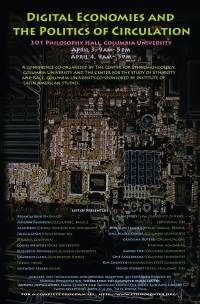Search
User login
Digital Economies and the Politics of Circulation
Event Start:
Fri, 04/03/2009 - 1:00pm - Sat, 04/04/2009 - 1:59pm
Location:
Philosophy Hall  Digital Economies and the Politics of Circulation
Digital Economies and the Politics of CirculationDates: April 3 and 4, 2009
Location: Philosophy Hall, Columbia University
A conference co-organized by
Ana María Ochoa
The Center for Ethnomusicology, The Music Department, Columbia University
Claudio Lomnitz
Center for the Study of Ethnicity and Race, Columbia University
For the detailed program please click here.
This is an interdisciplinary and transnational conference that seeks to explore the interrelationship between the changing status of textualities, the rise of informal economies and the global politics of circulation. By changing textualities we mean the transformation in modes of support and circulation of artistic artifacts and legal documents (from different types of musics, to cinema as well as documents that make up the legal archive). The point of departure for the conference is the realization that there is a gap between practices of archiving, production and circulation of different forms of textualities and their juridical status. The association between property, technology, art forms and governmentality is being challenged from a broad spectrum of creative practices, but this is not just a problem about intellectual property. The migration of the discussion in the globalization of the arts to a legal terrain brings to the foreground the increasing incommensurability between the local, national and global politics of diversity, and governmentality. Thus practices of exchange of digital texts become a radical site for the audiovisualization of the global crisis of the political entailed by this incommensurability.
Schedule
April 3 - 301 Philosophy Hall, Columbia University
9:00 - 12:00 PM - The arts, new technologies and informal economies
Brian Larkin (Anthropology, Barnard) - Making Equivalence Happen: The Social Architecture of Circulation.
Arilson Favareto (CECS/UFABC, Brazil) - Technology, Property Rights and Efficiency - Analyzing a Market of Cultural Goods in Brazil
Alex Dent (George Washington University) - Informality's Critical Intimacies in So Paulo
2:00 - 5:00 PM - Memory, justice and the politics of textual circulation
Julio Gaitn (Universidad del Rosario, Colombia) - Memory and Social Orthopedics. Old and New forms of Construction of Public Space in Colombia
Louise Meintjes (Duke University) - Memory, Justice and Ngoma Artistry in South Africa
Elizabeth Povinelli (Columbia University) - Cell Phone Ontologies
Lawrence Liang (Alternative Justice Forum, India) - Archive Fever and Copyright Delirium
6.00 PM - The Gabe M. Wiener Music and Arts Library,Dodge Hall, Seventh Floor
Installation and Reception
An Expanded Politics of Musical Presentation -- works from the Computer Music Center.
Art Installation by Elena Climent and Santiago Cohen.
With the collaboration of The Music Library and The Center for Ethnomusicology.
April 4 - 301 Philosophy Hall
9:00 - 12:00 PM - Circulation of Textualities and Legality: Opportunities and Closures
Alan Story (University of Kent, Copysouth, UK) - The Last Defense of the IP System: An Interview with Jamie Boyle. A Critical Commentary.
Ronaldo Lemos (Getlio Vargas Foundation, Brazil) - Everything is Under Control: The emerging global/peripheral music scenes, and how they reinvent the music business
Ana Mara Ochoa and Carolina Botero (Ana Mara Ochoa, Columbia University, and Organizacin Karisma, Colombia) -Tensions Between the Law and Different Practices of Music Circulation in Colombia
2:00 - 5:00 PM - Heritage, Indigeneity, Intellectual Property and the Digital Archive
Aaron Fox and Chie Sakakibara (Columbia University) - Repatriation as re-animation: bringing Iupiat music home to Alaska.
Kim Christen (Washington State U) - Access and Accountability: The Politics of Information Sharing and Indigenous Knowledge in the Digital Age
Henry Stobart (Royal Holloway, UK) - Digital Indigeneity: Cultural and Digital Revolutions in the Bolivian Andes
Anthony Seeger (UCLA) - Intellectual Property, Ethics, and Archival Strategies: Addressing Cultural Rights in the Internet Age
Upcoming Events
No upcoming events available
